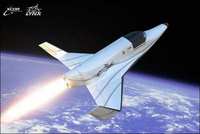Aviation - Lynx Spacecraft Will Help Investigate Upper Atmosphere, Edge Of Space
 |
Mojave, August 16, 2011: NASA has selected XCOR Aerospace to provide suborbital flight and payload integration services for research and scientific missions in a program that will offer up to $10 million dollars in contracts to match payload customers with flight vehicle services. The awards were announced by NASA's Flight Opportunities Program, a part of NASA's Office of the Chief Technologist at NASA Headquarters in Washington, DC that is managed at Dryden Flight Research Center in Edwards, California.
"Through this award, NASA has recognized XCOR's Lynx suborbital vehicle as a useful payload platform that will benefit both NASA's R&D needs and the private research, scientific, and educational communities," said Jeff Greason, XCOR CEO. "By encouraging and incentivizing frequent, low cost access to space, NASA is helping to ensure America's future as a leader in space."
XCOR's suborbital reusable launch vehicle, Lynx, is capable of up to four flights per day using advanced rapid call-up and turnaround operations. The Lynx will provide three to four minutes of microgravity as well as, if desired, exposure to a space environment. This will provide opportunities to investigate the largely unexplored regions of our upper atmosphere.
XCOR has partnered with four leading payload integration providers in the US to give NASA and the research community a first-rate experience for the Program's missions. The Planetary Science Institute (PSI) of Arizona, Southwest Research Institute (SwRI) in Texas, NanoRacks LLC of Kentucky and Washington, DC, and Spaceflight Services of Washington will provide payload processing and related support services based on their multiple areas of expertise. These independent payload service providers specialize in atmospheric science, physics, microgravity research, planetary science, Earth observation, and life sciences, and other areas. XCOR's partners are among the premier organizations in specialized suborbital and orbital commercial payload development and integration. PSI recently announced their Atsa Suborbital Observatory, a versatile facility that will maintain cameras and telescopes to conduct astronomical observations or remote sensing of the Earth, will fly on Lynx. SwRI is the pioneering national research institute that will be the first Lynx launch customer for broad based suborbital payload integration and research. NanoRacks and Space Flight Services are national leaders in orbital payload integration and science experimentation, with NanoRacks already providing research platforms on the International Space Station and SpaceFlight Services offering stand alone on-orbit research and transport of experiments to the ISS in the SpaceX Dragon capsule.
"We're building our Lynx suborbital vehicle to accommodate as many of these missions as possible," remarked XCOR's COO Andrew Nelson. "By integrating multiple payload spaces both inside the pressurized cabin and exposed to the vacuum of space we can handle a large variety of experiments as well as the researchers themselves. This is currently a very underserved market, with long lead times and no guarantee of payload recovery on conventional sounding rockets. NASA is jump-starting a revolution in the commercial space industry and scientific research by pairing up payload investigators with cutting edge private suborbital vehicle providers such as XCOR."